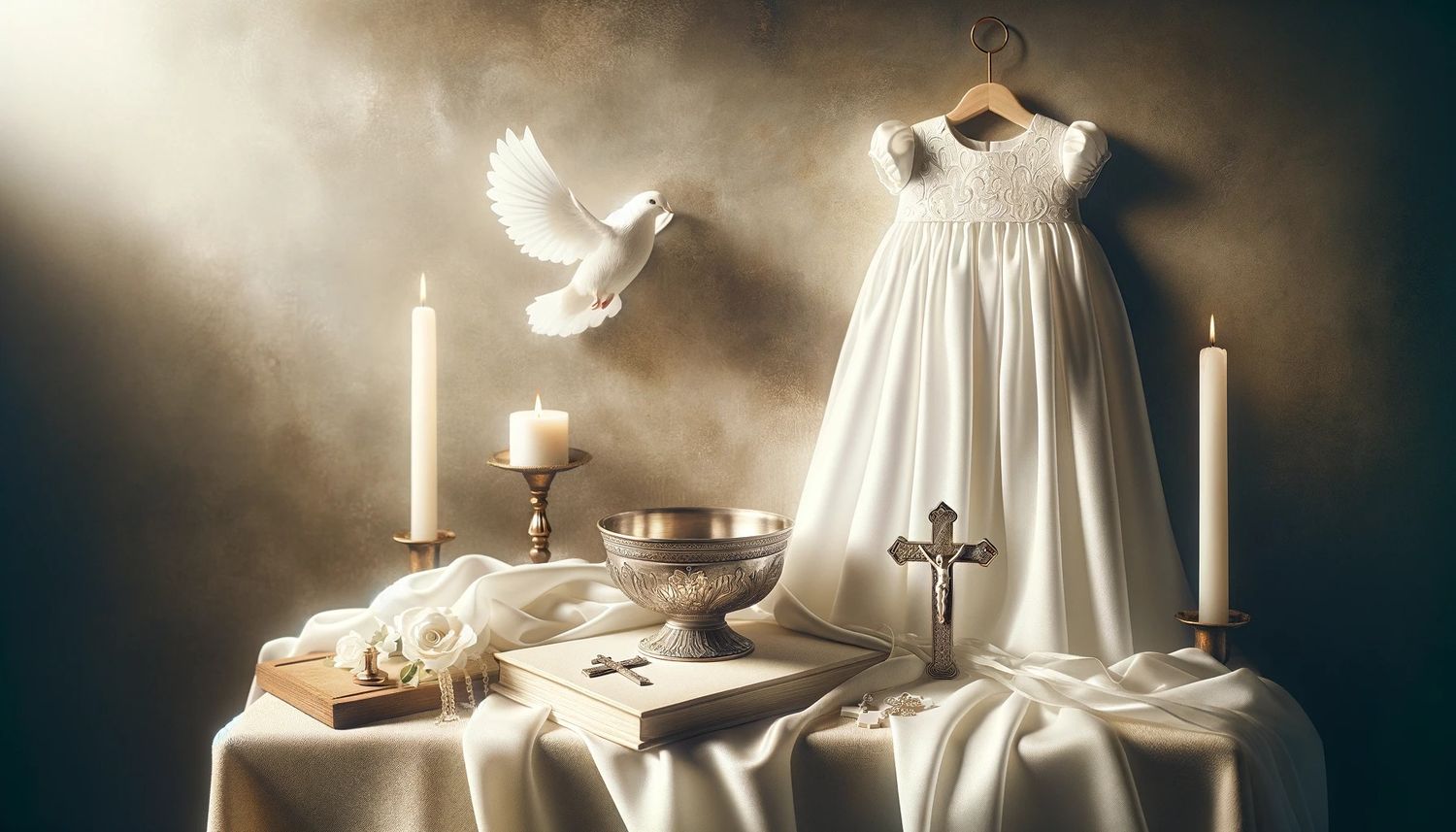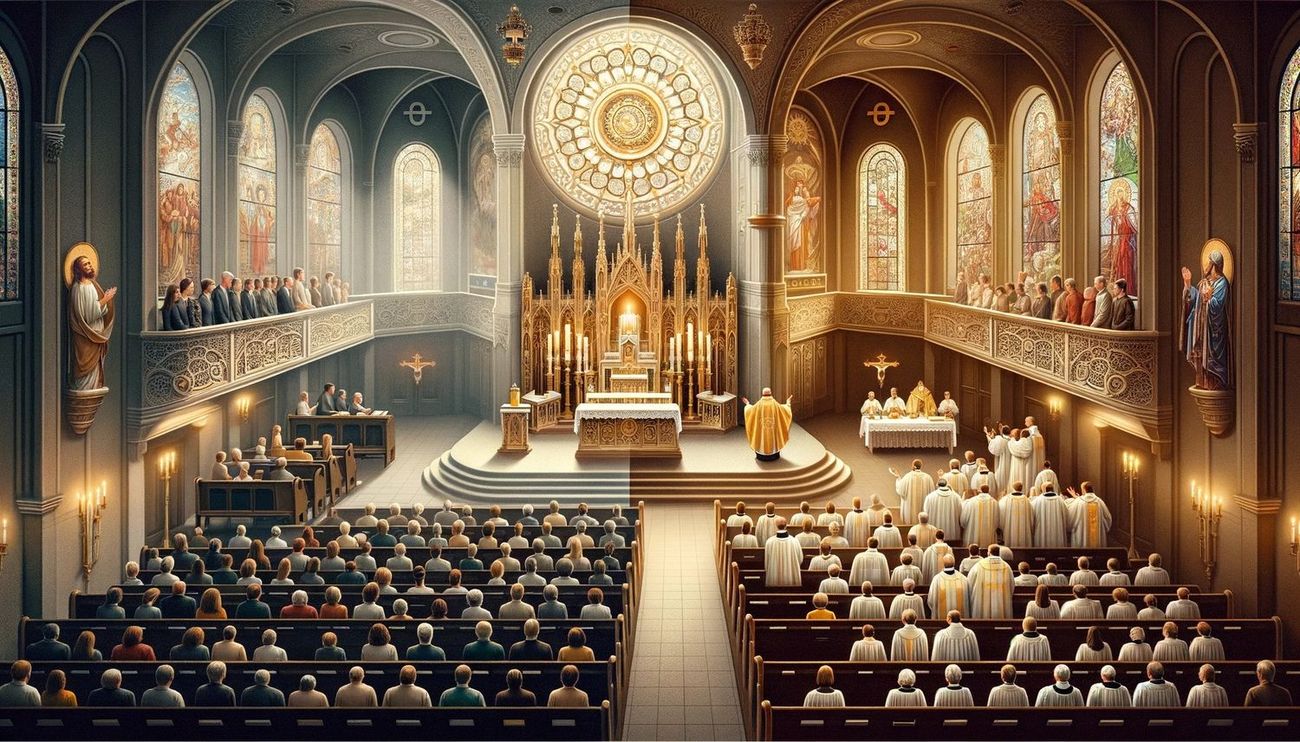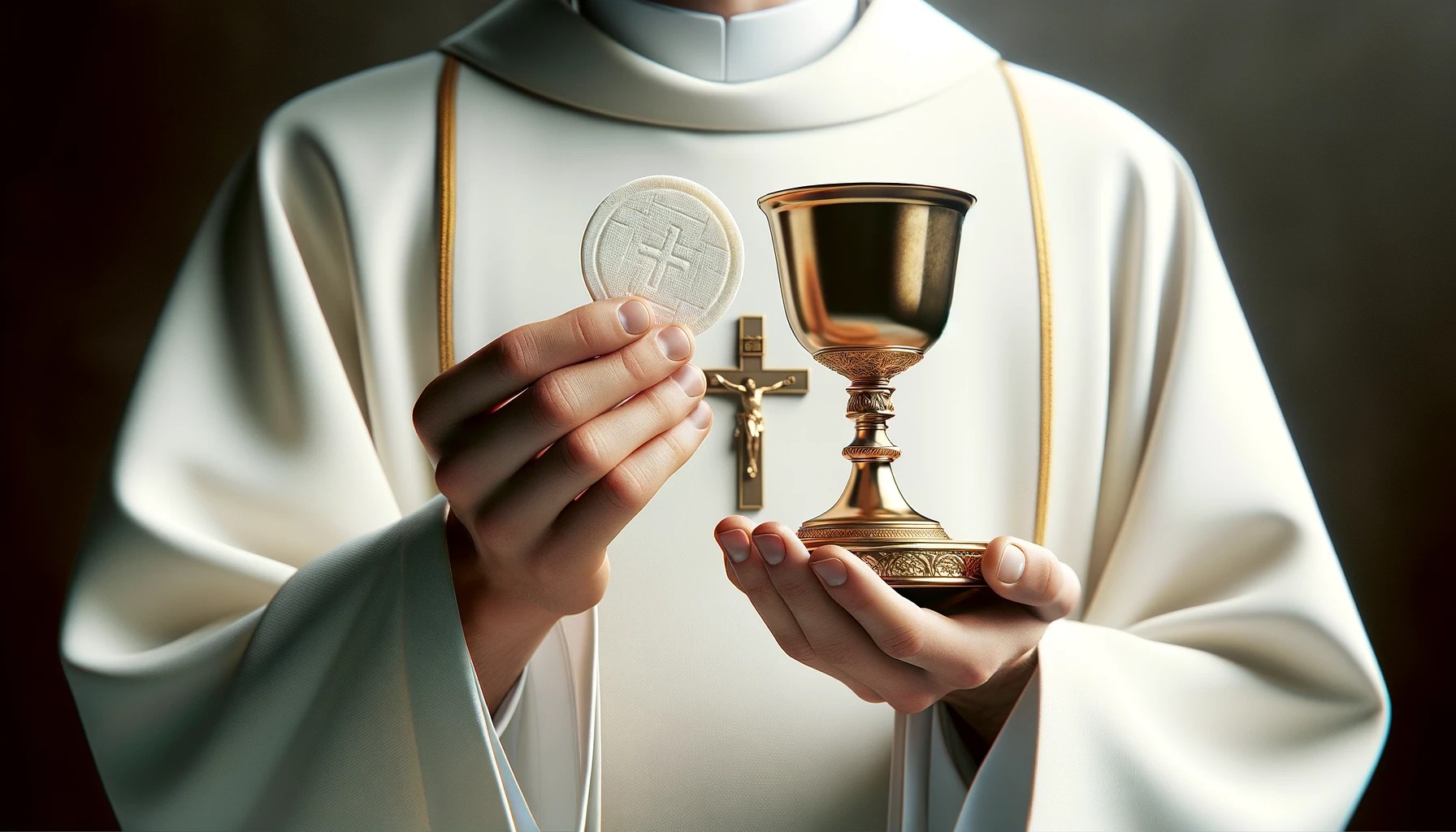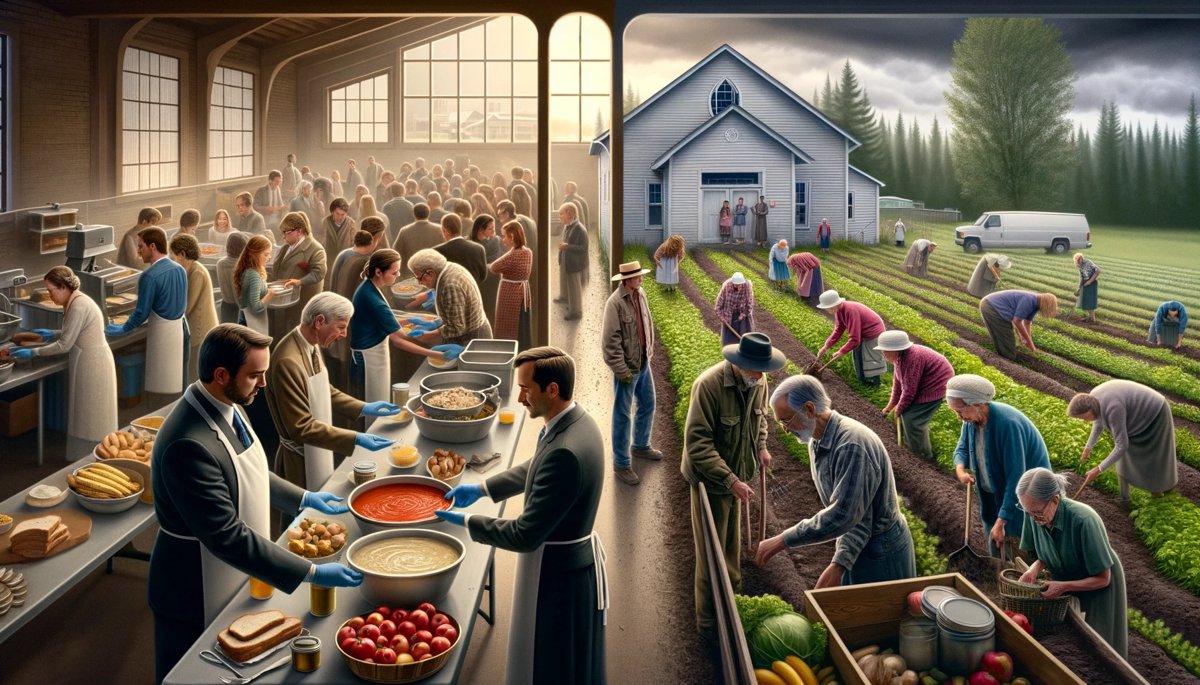Home>Theology and Spirituality>Difference Between Eucharist And Holy Communion
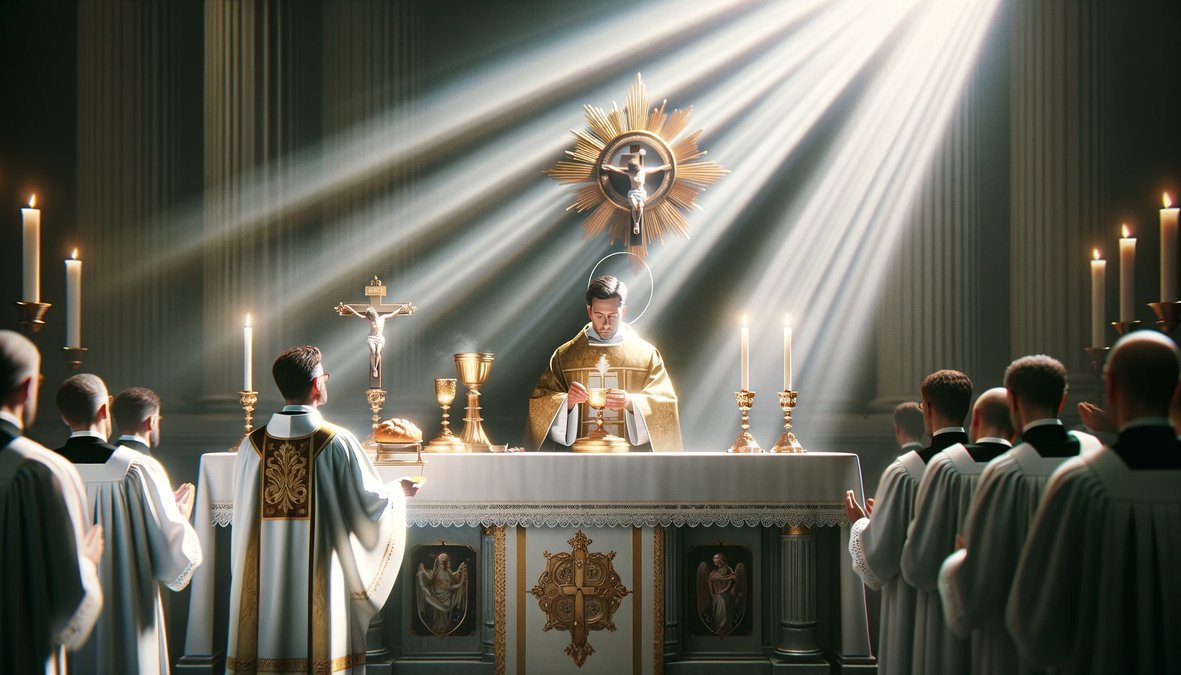

Theology and Spirituality
Difference Between Eucharist And Holy Communion
Published: February 24, 2024
Peter Smith, Editorial Director at Christian.net, combines deep insights into faith, politics, and culture to lead content creation that resonates widely. Awarded for his contributions to religious discourse, he previously headed a major organization for religious communicators, enhancing dialogue on faith's societal impacts.
Discover the distinctions and similarities between Eucharist and Holy Communion in theology and spirituality. Explore the significance and practices of these sacred rituals.
(Many of the links in this article redirect to a specific reviewed product. Your purchase of these products through affiliate links helps to generate commission for Christian.net, at no extra cost. Learn more)
Table of Contents
Introduction
The Eucharist and Holy Communion are central sacraments in Christian faith, revered for their profound spiritual significance and symbolic representation of the Last Supper. These sacred rituals hold a revered place in the hearts of believers, serving as a means of spiritual nourishment and communion with the divine. Understanding the nuances and distinctions between the Eucharist and Holy Communion is essential for appreciating their rich historical, theological, and spiritual significance.
The Eucharist, also known as the Holy Eucharist, is a sacrament celebrated in various Christian traditions, including Catholicism, Eastern Orthodoxy, and some Protestant denominations. It holds deep theological importance, symbolizing the body and blood of Jesus Christ, and is often considered a reenactment of the Last Supper. On the other hand, Holy Communion, also referred to as the Lord's Supper or the Breaking of Bread, is a term commonly used in Protestant denominations to describe the act of partaking in the bread and wine as a remembrance of Christ's sacrifice.
As we delve into the distinctions between these sacred practices, it is important to recognize the reverence and spiritual significance they hold for millions of Christians worldwide. The Eucharist and Holy Communion serve as powerful symbols of unity, remembrance, and divine grace, embodying the essence of Christian faith and the teachings of Jesus Christ. Let us embark on a journey to explore the profound meanings and differences encapsulated within these sacred rituals, delving into their historical roots, religious significance, and the unique practices associated with each.
Definition of Eucharist
The Eucharist, derived from the Greek word "eucharistia," meaning thanksgiving, is a central sacrament in the Christian faith, particularly in Catholicism and Eastern Orthodoxy. Also known as the Holy Eucharist, it is a sacred ritual that commemorates the Last Supper, where Jesus Christ shared bread and wine with his disciples. According to Christian belief, during this momentous event, Jesus instituted the Eucharist, instructing his followers to partake in the bread and wine as symbols of his body and blood, given for the forgiveness of sins.
At the heart of the Eucharist lies the concept of transubstantiation, a theological doctrine upheld by Catholicism and some other Christian traditions. According to this doctrine, during the Eucharistic celebration, the bread and wine undergo a profound spiritual transformation, becoming the actual body and blood of Christ while retaining their outward appearance. This belief underscores the profound mystery and sacredness of the Eucharist, as it is viewed as a direct encounter with the divine presence of Christ.
The Eucharist is typically celebrated within the context of the Mass or Divine Liturgy, where a priest consecrates the bread and wine, invoking the Holy Spirit to effect the transformation. The faithful then partake in the consecrated elements, receiving them as a means of spiritual nourishment and communion with Christ. This act of partaking in the Eucharist is considered a profound expression of faith, unity, and remembrance of Christ's sacrificial love.
The Eucharist holds deep theological significance, serving as a tangible manifestation of the Christian belief in the real presence of Christ in the sacrament. It is a sacred moment of thanksgiving, worship, and spiritual communion, inviting believers to enter into a profound encounter with the living Christ. The Eucharist is not merely a symbolic gesture but is believed to convey the actual presence of Christ, offering believers a transformative experience of grace and spiritual sustenance.
In summary, the Eucharist stands as a sacred sacrament that embodies the essence of Christian faith, serving as a powerful symbol of Christ's presence and sacrificial love. Its theological depth, historical roots, and spiritual significance make it a cornerstone of worship and devotion for millions of Christians worldwide.
Definition of Holy Communion
Holy Communion, also known as the Lord's Supper or the Breaking of Bread, holds significant importance in various Protestant denominations as a sacred ritual that commemorates the Last Supper and the sacrificial death of Jesus Christ. It is a deeply symbolic act that involves partaking in bread and wine, representing the body and blood of Christ, in remembrance of his ultimate sacrifice for the redemption of humanity.
In Protestant theology, Holy Communion is viewed as a symbolic or commemorative act, emphasizing the spiritual significance of Christ's sacrifice and the believers' unity with one another and with Christ. Unlike the doctrine of transubstantiation embraced by Catholicism and some other Christian traditions, most Protestant denominations adhere to the concept of consubstantiation or symbolic memorialism, wherein the bread and wine symbolize the body and blood of Christ, serving as powerful reminders of his redemptive work on the cross.
The act of Holy Communion is often conducted within the context of a worship service, where congregants gather to partake in the elements as a communal expression of faith, gratitude, and spiritual nourishment. The ritual is typically presided over by a minister or pastor, who leads the congregation in prayers and reflections on the significance of Christ's sacrifice and the believers' unity as the body of Christ.
Holy Communion serves as a poignant reminder of the central tenets of the Christian faith, emphasizing the themes of redemption, forgiveness, and spiritual renewal. It fosters a sense of community and shared devotion among believers, underscoring the profound bond that unites them as followers of Christ. Through the act of partaking in the bread and wine, believers reaffirm their commitment to Christ and their solidarity with one another, embodying the spiritual truths encapsulated in the Last Supper.
In essence, Holy Communion stands as a sacred practice that encapsulates the core beliefs of Protestant Christianity, serving as a powerful symbol of Christ's sacrificial love and the believers' unity in faith. Its significance lies in its ability to evoke a sense of reverence, gratitude, and spiritual communion among believers, fostering a deep connection to the foundational teachings of Jesus Christ and the redemptive message of the Gospel.
Historical and Religious Significance
The historical and religious significance of the Eucharist and Holy Communion spans centuries, encompassing profound theological developments, religious practices, and cultural influences within the Christian tradition. These sacred rituals are deeply rooted in the historical narrative of Christianity, carrying immense spiritual weight and serving as enduring symbols of faith, unity, and divine grace.
The Eucharist, with its origins in the Last Supper, holds a central place in Christian history and theology. The accounts of the Last Supper in the Gospels of Matthew, Mark, and Luke depict Jesus sharing bread and wine with his disciples, instructing them to partake in remembrance of him. This pivotal event laid the foundation for the Eucharistic tradition, as it became a central sacrament in early Christian communities. The writings of the early Church fathers, such as Ignatius of Antioch and Justin Martyr, provide insights into the early Christian understanding of the Eucharist as a sacred rite of thanksgiving and spiritual nourishment.
In the centuries that followed, theological debates and doctrinal developments shaped the understanding of the Eucharist, leading to the formulation of doctrines such as transubstantiation in Catholicism and the concept of the real presence of Christ in the Eucharistic elements. The Council of Trent in the 16th century solidified the Catholic Church's stance on transubstantiation, emphasizing the mystical transformation of the bread and wine into the body and blood of Christ during the Eucharistic celebration.
Similarly, Holy Communion, while sharing its historical roots in the Last Supper, underwent distinctive theological interpretations within Protestantism. The Protestant Reformation, spearheaded by reformers such as Martin Luther and John Calvin, brought about significant theological reforms, including a reevaluation of the Eucharistic doctrine. The concept of consubstantiation, symbolic memorialism, or spiritual presence emerged as alternative interpretations of the Lord's Supper, reflecting the diversity of theological perspectives within Protestant traditions.
The historical and religious significance of the Eucharist and Holy Communion extends beyond theological discourse, encompassing their role in shaping Christian worship, spirituality, and communal identity. These sacred rituals have been integral to the liturgical practices of various Christian denominations, serving as focal points of worship, spiritual renewal, and communal bonding. The celebration of the Eucharist and Holy Communion has fostered a sense of unity and shared devotion among believers, transcending cultural and geographical boundaries to affirm the universal presence of the Christian faith.
In summary, the historical and religious significance of the Eucharist and Holy Communion is deeply intertwined with the historical narrative of Christianity, theological developments, and the enduring spiritual impact they have had on believers throughout the ages. These sacred rituals stand as timeless symbols of Christ's presence, sacrificial love, and the unifying power of faith, embodying the rich tapestry of Christian history and spirituality.
Differences in Practice
The Eucharist and Holy Communion, while sharing common theological roots in the Last Supper, exhibit distinct differences in their practice within various Christian traditions. These differences encompass the theological understanding of the sacraments, the liturgical rituals surrounding their celebration, and the doctrinal interpretations that shape their significance for believers.
In the Catholic and Eastern Orthodox traditions, the Eucharist is celebrated as a central component of the Mass or Divine Liturgy, characterized by its richly symbolic and liturgical elements. The Eucharistic celebration is presided over by a priest, who consecrates the bread and wine, invoking the Holy Spirit to effect the transformation into the body and blood of Christ, as per the doctrine of transubstantiation. The faithful partake in the consecrated elements as a means of spiritual nourishment and communion with Christ, emphasizing the real presence of Christ in the Eucharist.
On the other hand, Holy Communion in Protestant denominations is often observed as a symbolic or commemorative act, distinct from the sacramental theology of transubstantiation. The ritual of Holy Communion is typically integrated into the worship service, where congregants partake in the bread and wine as a communal expression of faith and remembrance of Christ's sacrifice. The theological interpretations within Protestantism vary, with some denominations emphasizing the symbolic nature of the elements, while others underscore the spiritual significance of the believers' unity and communion with Christ.
Furthermore, the liturgical practices and ceremonial aspects associated with the Eucharist and Holy Communion differ across Christian traditions. The Eucharistic celebration in Catholicism and Eastern Orthodoxy is characterized by intricate rituals, including the use of incense, liturgical vestments, and prescribed prayers, reflecting the solemnity and reverence accorded to the sacrament. In contrast, Holy Communion in Protestant worship often features a more simplified approach, with a focus on congregational participation, communal prayers, and reflective readings that underscore the spiritual significance of the Lord's Supper.
The differences in practice between the Eucharist and Holy Communion underscore the diverse theological perspectives and liturgical expressions within the tapestry of Christian worship. While the Eucharist emphasizes the real presence of Christ and the sacrificial nature of the sacrament, Holy Communion in Protestant traditions highlights the symbolic remembrance of Christ's redemptive work and the believers' communal unity in faith. These distinctions in practice reflect the rich diversity of Christian worship and theological interpretation, shaping the spiritual experiences of believers within their respective traditions.
Similarities and Shared Beliefs
Despite the distinct theological and liturgical differences between the Eucharist and Holy Communion, these sacred rituals share fundamental similarities and core beliefs that unite Christians across denominational boundaries. At the heart of both practices lies a profound reverence for the Last Supper, the sacrificial death of Jesus Christ, and the spiritual nourishment derived from partaking in the bread and wine.
First and foremost, both the Eucharist and Holy Communion serve as powerful symbols of remembrance and gratitude for Christ's redemptive sacrifice. The act of partaking in the bread and wine, whether viewed as the actual body and blood of Christ or as symbolic representations, underscores the central message of Christ's sacrificial love and the forgiveness of sins. This shared emphasis on remembrance and gratitude unites believers in their acknowledgment of Christ's atoning work on the cross, fostering a deep sense of reverence and spiritual reflection.
Furthermore, both the Eucharist and Holy Communion embody the concept of spiritual communion and unity among believers. Regardless of doctrinal nuances, the act of partaking in these sacred rituals signifies a communal bond among Christians, emphasizing their shared identity as followers of Christ. The Eucharistic or Communion table becomes a symbol of inclusivity, inviting believers to partake in the spiritual sustenance offered by Christ, transcending denominational distinctions and fostering a sense of unity within the body of Christ.
Additionally, both practices emphasize the transformative power of grace and spiritual nourishment derived from partaking in the sacramental elements. Whether through the real presence of Christ in the Eucharist or the symbolic representation of his body and blood in Holy Communion, believers are invited to encounter the living Christ and experience a profound sense of spiritual renewal and sustenance. The shared belief in the transformative nature of the sacraments underscores their significance as channels of divine grace and sources of spiritual strength for believers.
Moreover, the Eucharist and Holy Communion serve as tangible expressions of thanksgiving and worship, inviting believers to enter into a sacred encounter with the divine. The act of partaking in the sacramental elements is characterized by a spirit of reverence, gratitude, and adoration, reflecting the shared belief in the sacred nature of the rituals and their capacity to draw believers into a deeper communion with Christ.
In essence, the Eucharist and Holy Communion, despite their distinct theological interpretations and liturgical practices, embody shared beliefs that resonate across Christian traditions. Their significance as symbols of remembrance, unity, grace, and worship underscores their enduring relevance as central sacraments that bind believers together in their devotion to Christ and the foundational truths of the Christian faith.
Conclusion
In conclusion, the Eucharist and Holy Communion stand as profound expressions of Christian faith, embodying the timeless significance of the Last Supper and the sacrificial love of Jesus Christ. These sacred rituals, celebrated across various Christian traditions, hold deep theological, historical, and spiritual importance, serving as pillars of worship, unity, and divine communion.
The Eucharist, rooted in the doctrine of transubstantiation in Catholicism and the real presence of Christ in Eastern Orthodoxy, encapsulates the belief in the mystical transformation of the bread and wine into the actual body and blood of Christ. It represents a sacred encounter with the living Christ, inviting believers to partake in the divine grace and spiritual nourishment offered through the sacramental elements. The Eucharist's rich liturgical traditions and theological depth underscore its role as a central sacrament that embodies the essence of Christian worship and devotion.
On the other hand, Holy Communion in Protestant denominations emphasizes the symbolic or commemorative remembrance of Christ's sacrifice, fostering a sense of communal unity and spiritual reflection. While doctrinal differences exist regarding the nature of the sacramental elements, Holy Communion serves as a unifying practice that draws believers together in gratitude, remembrance, and shared devotion to Christ's redemptive work.
Despite the differences in theological interpretation and liturgical practice, the Eucharist and Holy Communion share fundamental similarities in their emphasis on remembrance, unity, grace, and worship. Both practices serve as powerful symbols of Christ's sacrificial love, inviting believers to partake in the spiritual sustenance and communal bond offered through the sacramental elements. They transcend denominational boundaries, affirming the universal presence of the Christian faith and the enduring significance of the foundational truths encapsulated in the Last Supper.
Ultimately, the Eucharist and Holy Communion stand as enduring testaments to the central message of the Gospel, inviting believers to enter into a sacred encounter with the living Christ, experience spiritual renewal, and unite in gratitude and worship. Their historical and religious significance, theological depth, and unifying power make them integral components of Christian worship, reflecting the timeless relevance of the foundational teachings of Jesus Christ and the enduring impact of his redemptive love on the lives of believers worldwide.



